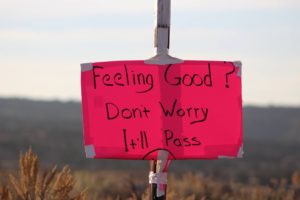
After an ultra season that included two age-group wins in the 100-mile distance and some other fast times I was proud of, my training came to a grinding halt. This winter has been a personal running disaster. In late November, I started feeling sluggish and unmotivated. I blamed Donald Trump. In early December, I caught what I thought was the flu. It lingered. After a week of total sloth, I still felt tired all the time, out of breath for no apparent reason, unable to run – no, shuffle – for more than a couple of miles before I had to stop and gasp for air. I slept nine hours a night, but did not feel rested in the morning.
I tried to run through it. I though it was all in my head. I headed out for my usual thirteen—mile loop almost every day, but ended up walking a large part of it most days.
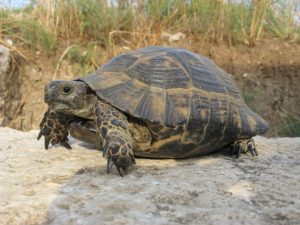
About my speed this winter.
By mid-January, I finally felt a bit more energetic, then promptly caught what I thought was another flu-like illness. It also lingered. My mileage remained stuck in the thirties and forties, counting the walking miles. I normally run 75-85 weekly miles and don’t walk any of them. I felt unfit, frustrated, and somewhat concerned.
By now, you might ask why I did not go to a doctor. A valid question, The answer is that doctors terrify me. The last time I saw one was in 2014, right before Leadville. She diagnosed me with strep. I tried to run anyway, and DNFd at mile 50. It goes without saying that I blamed the doctor. Since then, I have tried to avoid members of the medical profession, because just the thought of a doctor visit triggers PTSD-like flashbacks.
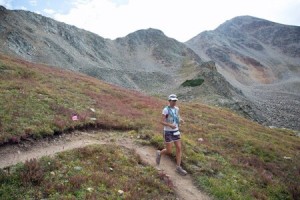
Leadville 2014, on my way to a DNF at Winfield.
Until last week, that is. Two weeks after my flu symptoms had gone away, I still felt lethargic. Any time I tried to suck it up and just run, my heart rate shot up into unfamiliar territory, like 170 or 180, which did not seem right. The number scared me enough to seek professional help.
I walked into the doctor’s office feeling immediately worse. Even the potted plants in the waiting area looked sick. The main reading material consisted of Prevention magazines. Leafing through a couple of them did nothing to alleviate my mounting anxiety. The MD, a very overweight individual, took my vital signs. She wanted to know what was wrong. When I said I felt tired after running a few miles, she seemed to think that was normal. She also said that my resting heart rate, which hovered in the low seventies, was fine. When I told her this was more than twenty beats above where it should be, she looked skeptical. She asked me a ton of questions, like when was the last time I had blood work done? My answer, which was an emphatic “Never!,” seemed to astonish her.
I bravely agreed to have blood sucked out of my arm via a needle that looked large enough to double as a drinking straw. I was informed that the results would not be available for a week. In the meantime, I consulted Dr. Google.
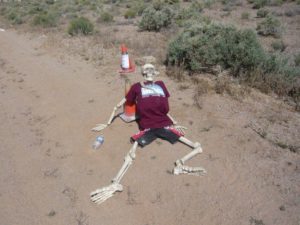
How I envisioned my near future
It’s been an interesting process. Googling my questions opened up a bewildering universe of online medical advice. There are articles, blogs, tons of websites, forums, and even symptom checkers. I looked for answers. Instead, I found a tangled web of conflicting information. Alternative facts may be a new phenomenon in the political arena, but in the realm of of medicine, it’s a different story. Wildly divergent opinions, each claiming truth based on scientific studies, seem to have coexisted peacefully for years. I did what every sane, reasonable ultra runner would do in such a situation: I totally freaked out. I thought I was heading for an early grave. I thought I had heart arrythmia, and anemia on top of it. I thought I suffered from lupus, lyme, lymphoma, or a combination of them. I felt the symptoms of every disease I read about, developing a whole new level of respect for medical students in the process. How do they manage three years of studying these things?
Just before my overactive imagination wreaked more havoc, it was time to go back to the doctor. She told me my blood work was fine, except that I had tested positive for the Epstein-Barr virus, with an active infection in the recent past. In other words, I had, or was recovering from, mono, aka the kissing disease.
Most people get this by the time they graduate from middle school. As a late bloomer more interested in horses than in boys throughout my adolescence, I had apparently avoided it all the way through high school and college. Now, at 46, the virus had finally caught up with me, and attacked me with a vengeance. Recovering from mono takes as long as it damn well pleases. There is no treatment other than taking it easy. I was bummed. At the same time, I was relieved. Epstein-Barr, though nasty, is neither deadly nor chronic. Plus, I could say good-bye to the sneaking suspicion that I was just being a lazy hypochondriac.
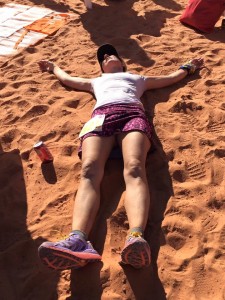
2016 Antelope Canyon. No, I’m not being lazy. I just ran 50 miles.
So, instead of planning my spring races, I will focus on slowly rebuilding my fitness, and return to racing when my body feels ready. I will try to be patient. I will try to be smart. But I already blame the doctor for my Antelope Canyon DNS in two weeks. I have also learned two valuable lessons:
When you can’t run, shuffling along for a few miles is still better than walking. When you can’t shuffle, walking a few miles is still much, much better than sitting still.
Never, ever take your health and fitness for granted. When I can run real mileage again, which I hope will be soon, I intend to cherish every second.
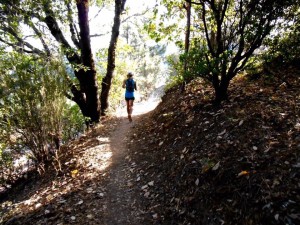
Light at the end of the tunnel
In spite of everything, it is a good time to be alive and moving, even at a snail’s pace,
Katrin
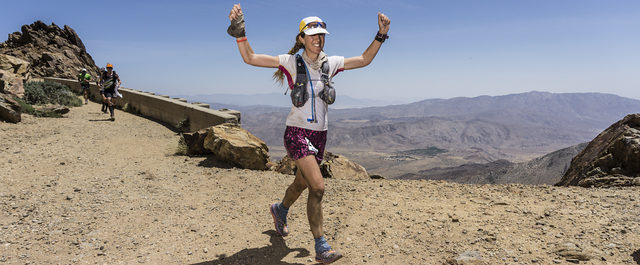

Having survived Mono, I know exactly how you felt/feel. It does indeed take time (rest) to recover. You need to watch for enlarged spleen, which can cause problems if you try to do too much too soon. You know that rupture thing. I always felt Mono was your body telling you not to stay in a state of constant fatigue.
Also, I have heard that running with four legged animals ( like Burros) is helpful during recovery phase.. See you in Leadville??
Michael, thank you for reading my blog, and for your wise words! I think I’m past the acute phase, so easing back into training, but I try to be smart about it. You are right about the body not responding well to constant stress, which is one of the reasons I am leaving my “real” job in May. I look forward to being self-employed in the horse world once again. Burro racing will definitely be an important part of my new life!
Glad what it is got figured out, even by the overweight doc who hasn’t a clue about ultra runner bodies. Most don’t. Glad you were able to take what she did know about and use it to begin the long trail back to full health. Take care.
I will, MaryAnn. It helps to know it was not all in my head. Thank you for reading, and for commenting.
Well written. Funny.
Thank you, Tim. I think it’s only funny to ultra runners 🙂
Great piece. Thanks for opening up and sharing your story with the public. Well written, thoughtful, vulnerable, with some a good dose of humor sprinkled throughout. I especially loved the part about – if you can’t run, shuffle, and if you can’t shuffle, walk. Great ultra advice for training, racing, and recovery.
Glad to see that you finally got it figured out. Happy healing.
Forever UPward & ONward . . .
Thank you, Jester, for reading and for taking the time to respond. I ran/shuffled 61 miles last week and think recovery is happening. One additional piece of ultra advice: If you can’t run an ultra, go volunteer – it’s the next best thing, and it’s what I am doing this weekend at Antelope Canyon. Hope to see you at some point this summer!
Kat…thanks for volunteering at antelope ultra! It was a pleasure to meet you and talk over the course. Then, with a generous spirit you lent me a pair of your tights because it was freezing butt cold! I’d like to get them back to you! Lisa
Hey Lisa, I hope you finished strong, and I hope the tights were useful! Thank you for finding my little blog. I’ll email you my mailing address.
Katrin
I just stumbled upon this – me, ultra-runner girl with EBV – about to start my supplements/protocol in a couple of weeks – I’m just wondering how you’re doing now – 2018?
I’m fully recovered and back running ultras. There’s hope!